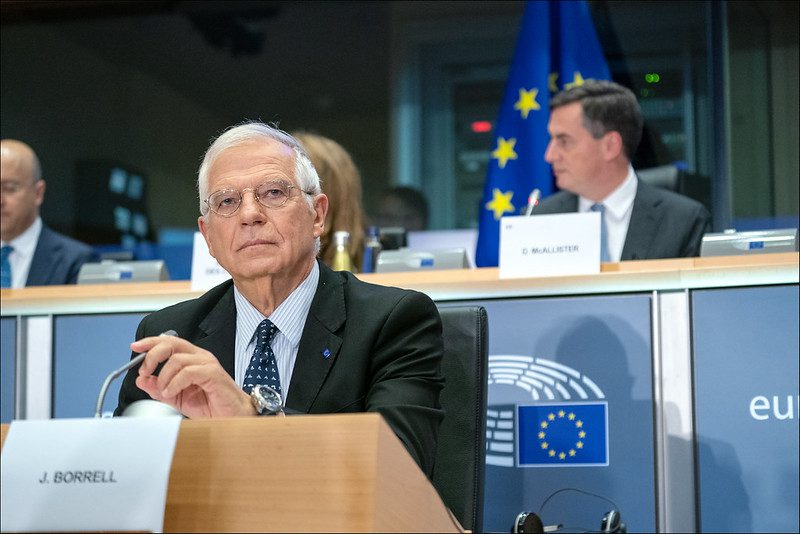
While the bulk of the world’s attention is on Europe’s East, an old wound has reopened in its center. The Dayton Peace Agreement, which in 1995 ended the Bosnian civil war, costing the lives of over 100,000, is in danger of falling apart.
In December 2021, lawmakers of an enclave within Bosnia, specially created for ethnic Serbs, voted yes on a set of provisions that would see it gradually opt out of national institutions. Even though the vote was non-binding, for all intents and purposes, it would mean secession. After this, a domino effect could follow, with violence spreading across the western Balkans.
In 1995, the U.S.-brokered peace agreement had established two separate governing entities in Bosnia—one run by its Orthodox Serbs and the other dominated by the country’s Muslim Bosniaks and Catholic Croats. The two entities are linked by joint institutions, and all actions performed at the national level needed to obtain consensus of all three ethnic groups.
As the Russia-NATO standoff preoccupied Western leaders in late 2021, the worrying development did not receive the care it merited. But at a meeting of EU foreign ministers last Monday, EU foreign policy chief Josep Borrell at last presented their response, saying “there is no place in Europe for a divided Bosnia and Herzegovina,” and that “those who work in this direction are strongly wrong.”
Even though most EU countries wanted sanctions to be imposed, the union had thus far shied away from introducing them. The bloc has now agreed to limit financial assistance and, should dialogue fail, to impose sanctions to dissuade Bosnia from breaking up.
The situation is further complicated by calls for autonomy by Bosnian Croat nationalists. On February 19th, the Croatian National Assembly (HNS), which represents most Bosnian Croat political parties, threatened to launch legal procedures to create its own entity in Bosnia unless the electoral law is amended to increase Croats’ presence in national institutions. Without a reform, HNS promised to boycott the general election in October, which could plunge the country into a constitutional crisis.
For now, the EU prefers dialogue “in order to ensure the reforms needed to develop the forthcoming elections,” Borrell said. Croatian officials desire such a debate to be held at the next EU summit in March.
Last January, the U.S. had already imposed sanctions on Bosnia’s Serb President Milorad Dodik over “corrupt activities” that threatened to destabilize the region. Dodik had been vocal about Serb grievances for 15 years, but his latest move to withdraw the Republika Srpska from key Bosnian institutions, most notably the armed forces, proved too much for Washington.
Dodik now seeks to establish Serb-only government bodies. Any such move is in violation of a bitterly achieved peace, and provides, observers fear, ample tinder for a new Bosnian conflict. An estimated 101,000—mainly Bosniaks—were left dead after the 1992-1995 civil war. It was the first recorded genocide in Europe since World War II.
Dodik—known for downplaying the Srebrenica genocide, 1995, of Bosnian Muslims by Serbs—had previously threatened to secede over a law that banned the denial of the massacre. The U.S., in response, has threatened to use sanctions should the Bosnian Serbs secede and formally join Serbia.
Exacerbating the issue is Russia which, eager for opportunities to undermine the West’s power within its own borders, has voiced support for Dodik’s cause and is actively influencing the wider Balkan region for geopolitical advantage.
Strong condemnation from both the EU and the U.S. leaves Dodik imperturbed however. In an interview with the Financial Times, he rejected accusations that his political ambitions undermine Bosnia’s stability. He instead sees Bosnia as a loose federation with wide regional autonomy (for each ethnic group), and insists secession is not among his goals. “If there is no agreement that will satisfy all stakeholders, a question arises of what happens to Bosnia then,” he said.
In his opinion the power balance had tipped in recent years, away from the separate entities and to the federal level. This gave Bosniaks—which make up about half of the Bosnian population—greater influence, he argued. “The state level of Bosnia was given undue powers. We are not enthusiastic about Bosnia. Bosnia was imposed on us.”
